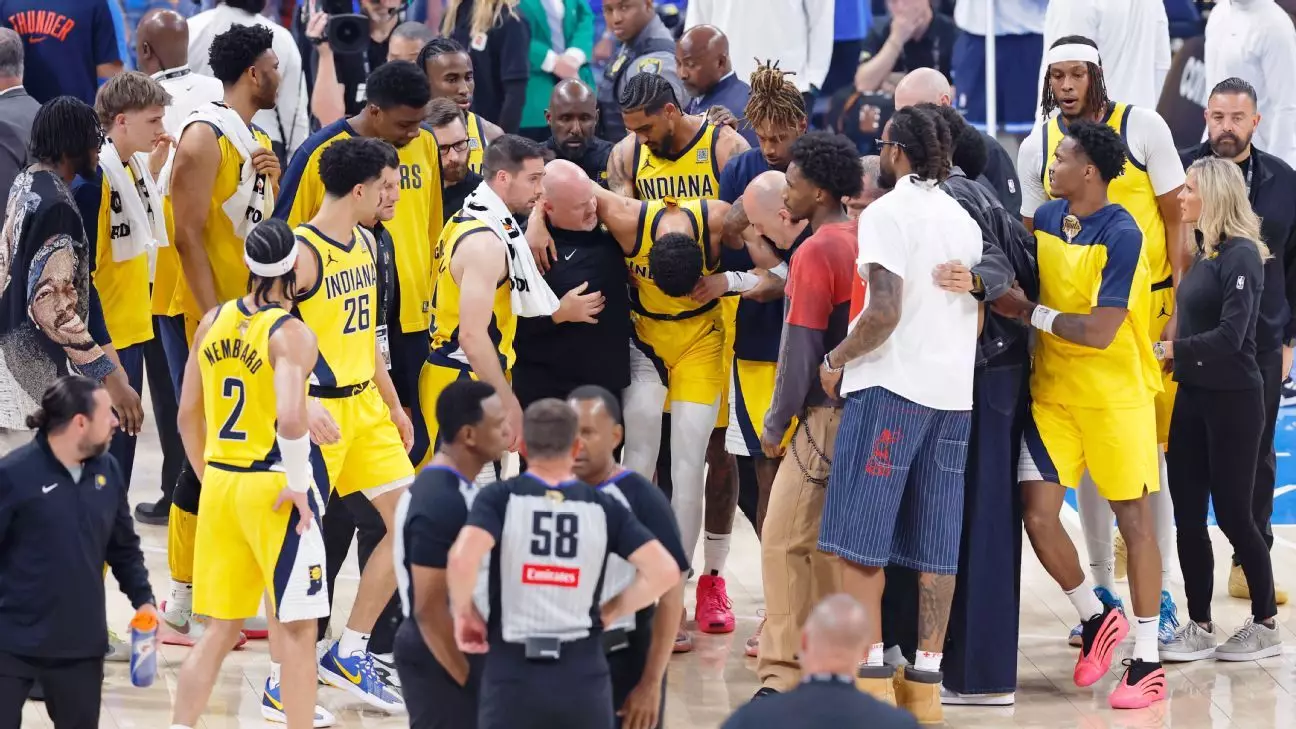Tyrese Haliburton’s steadfast determination and commitment to his teammates and the city of Indiana are commendable virtues that resonate deeply with any sports fan. His emotional social media post after tearing his Achilles during the NBA Finals reveals a profound dedication to both personal excellence and team spirit. “I’d do it again, and again after that, to fight for this city and my brothers,” he declared. This declaration is not just a statement; it’s a raw reflection of what athletes often sacrifice in pursuit of greatness, bringing to light the moral complexities of perseverance and the consequences it can entail.
However, while his bravery is commendable, one must ponder whether such reckless courage is to be truly celebrated. Is the pressure to sacrifice one’s body for a team’s success an outdated ethos, or does it symbolize the very essence of athletic valor? The lines between heroism and self-destructive behavior seem increasingly blurred as discussions about athlete well-being and mental health gain traction in modern sports. Haliburton’s choice to play through injury speaks to a culture that often rewards pain tolerance over sound judgment, raising critical questions about priorities in competitive environments.
The Pain of Regret
Haliburton’s decision to chase glory despite a visible calf strain resulted in a catastrophic injury that halted his remarkable playoff run. The emotional aftermath of this negligence must weigh heavily on him, and understandably so. The words of his heartfelt message reflect not just the physical toll of the injury but the psychological burden as well: “Words cannot express the pain of this letdown.” A concern arises here: How prepared are athletes to handle the multi-dimensional pain of professional sports? Injuries aren’t just physical setbacks; they often culminate in an emotional crisis, placing athletes in a paradox of strength and vulnerability.
Professional sports create a competitive landscape where the stakes are unbearably high, which can lead to athletes pushing their limits in desperation. In the case of Haliburton, we witness the unfortunate erosion of logic in the face of ambition. The ‘win at any cost’ mentality lacks consideration for an athlete’s long-term health and happiness, making the ideals of sportsmanship a double-edged sword that can cut deep.
An Industry of Injuries
Haliburton’s experience doesn’t exist in a vacuum; it illustrates a broader trend amongst athletes who have faced similar fates. The 2025-26 season will see him sidelined, joining fellow stars Damian Lillard and Jayson Tatum as victims of the dreaded Achilles injury. This trio’s misfortune raises pressing concerns about the prevalence of injuries in high-impact sports. As the once-celebrated notion of playing through pain backfires, we are pulled into a harrowing dialogue about player protection and medical ethics in sports.
What does it say about the NBA, or any league for that matter, when star players are pushed beyond their limits, often against the advice of trainers? The industry’s relentless drive for entertainment can sometimes overshadow the health and wellness of its players. In every injury that halts an athlete’s career trajectory lies an ethical dilemma that should provoke serious reflection not just from fans but also from league officials, coaches, and, critically, players themselves.
Reconstructing Spirit and Body
Following surgery, Haliburton’s post suggests he is determined to forge a path forward — “I get to go through this,” he states optimistically. His mentality of focusing on rehabilitation instead of dwelling on the injury is impressive, and yet it is tinged with the weight of forced optimism. The wrestling of thoughts between pain and hope is one that many athletes face when grappling with injuries. It represents a struggle many can relate to, making Haliburton’s journey, however tragic, also a story of resilience.
As he begins this arduous recovery, one can only hope that Haliburton becomes a voice for a growing movement within sports advocating for mental wellness and the importance of self-care. NFL quarterback Andrew Luck and NBA star Kevin Durant have both publicly discussed their battles with mental and physical health, indicating that it is acceptable to prioritize oneself. In a society where athletes are often celebrated for their ‘toughness’ at the expense of their overall well-being, it is time to raise awareness and create supportive systems that allow athletes to prioritize their long-term health over immediate glory.
As emotional as Haliburton’s words resonate, they are a sobering reminder that sports should be about more than just triumph or glory; they should value human experience and self-care just as much.


Leave a Reply